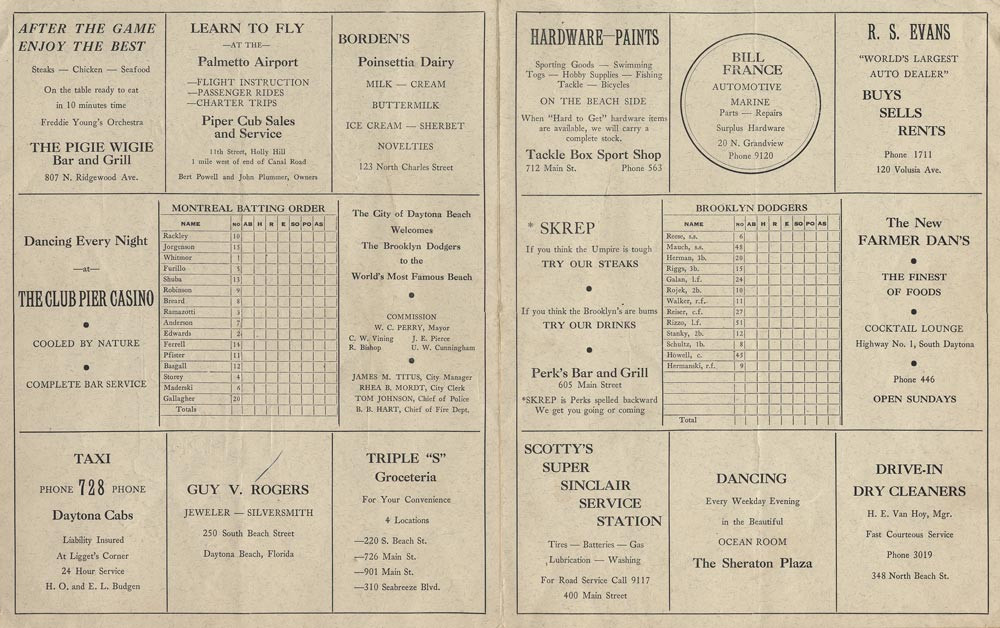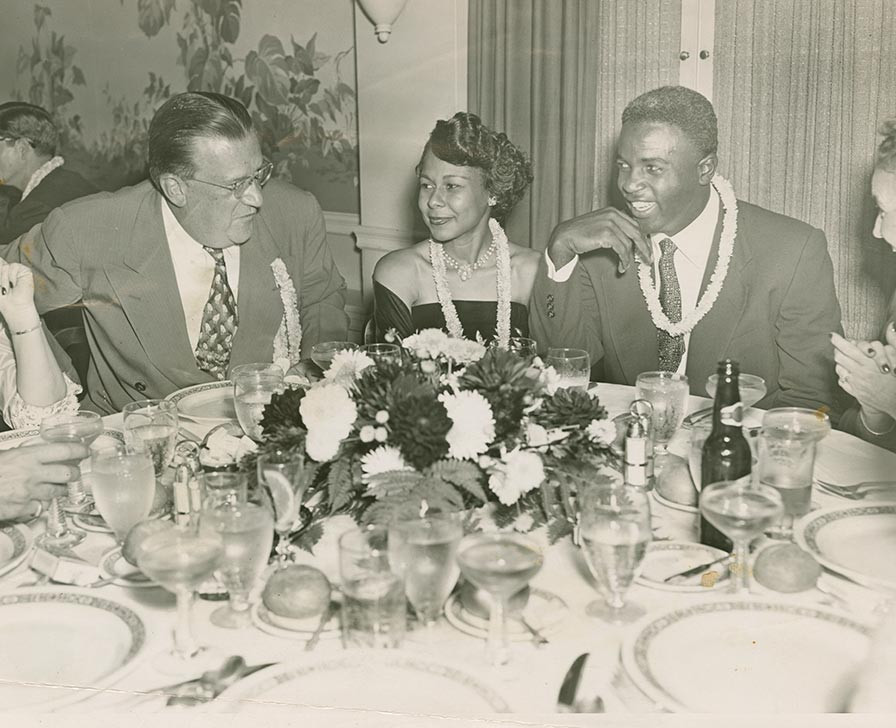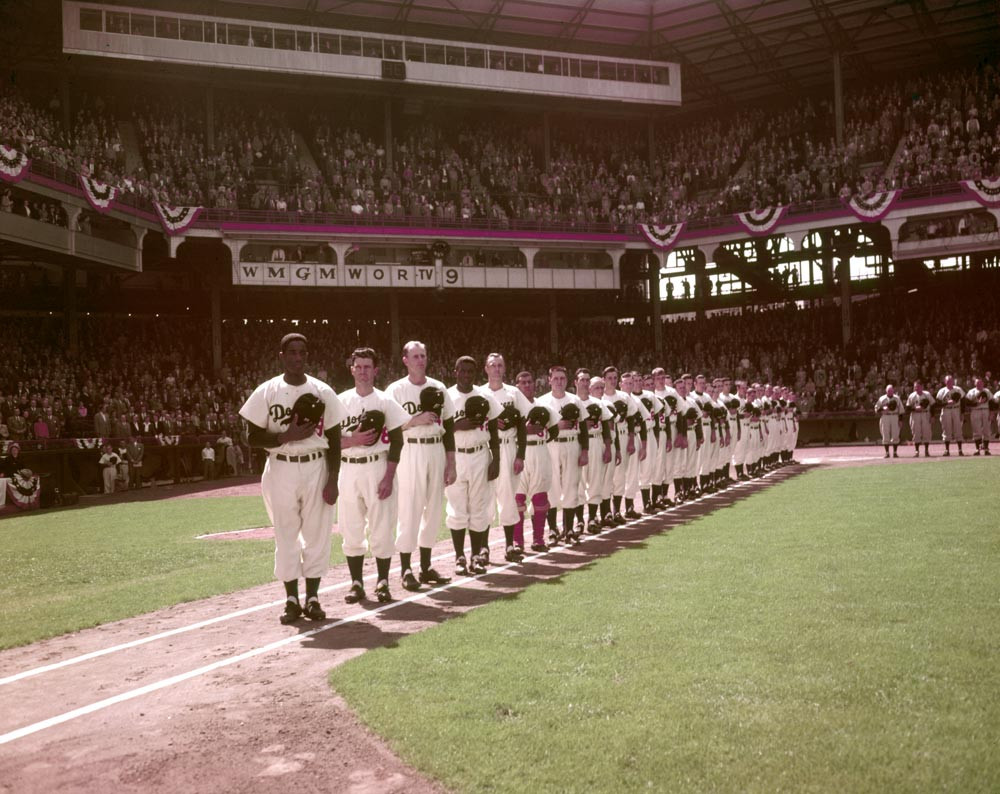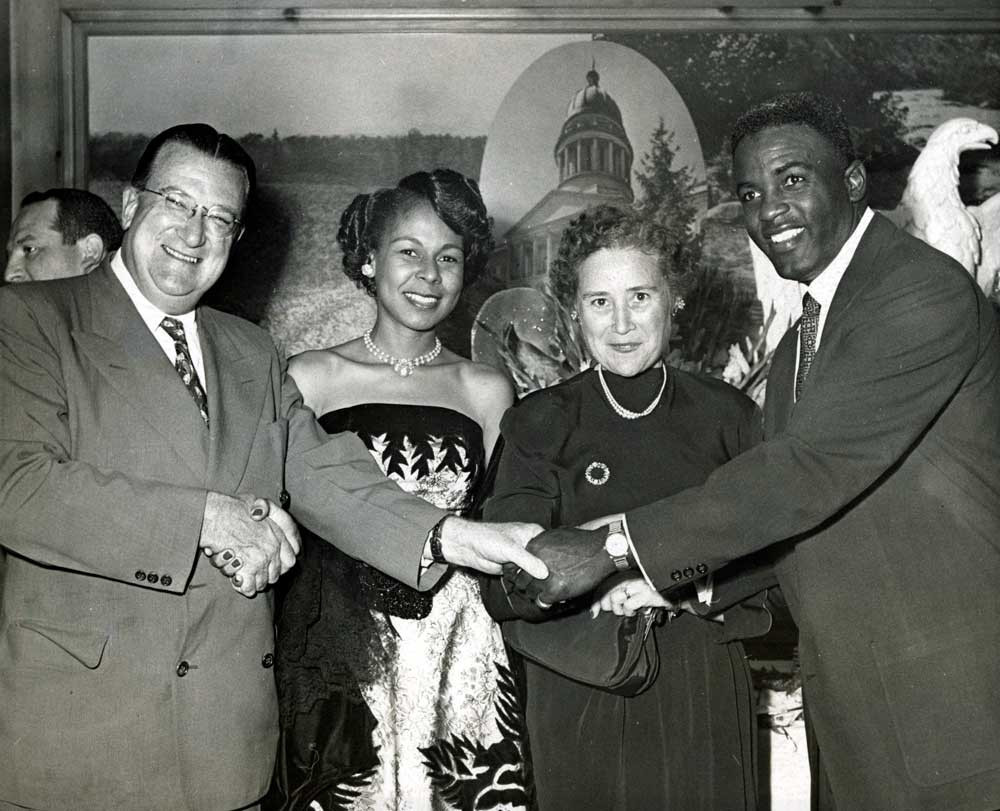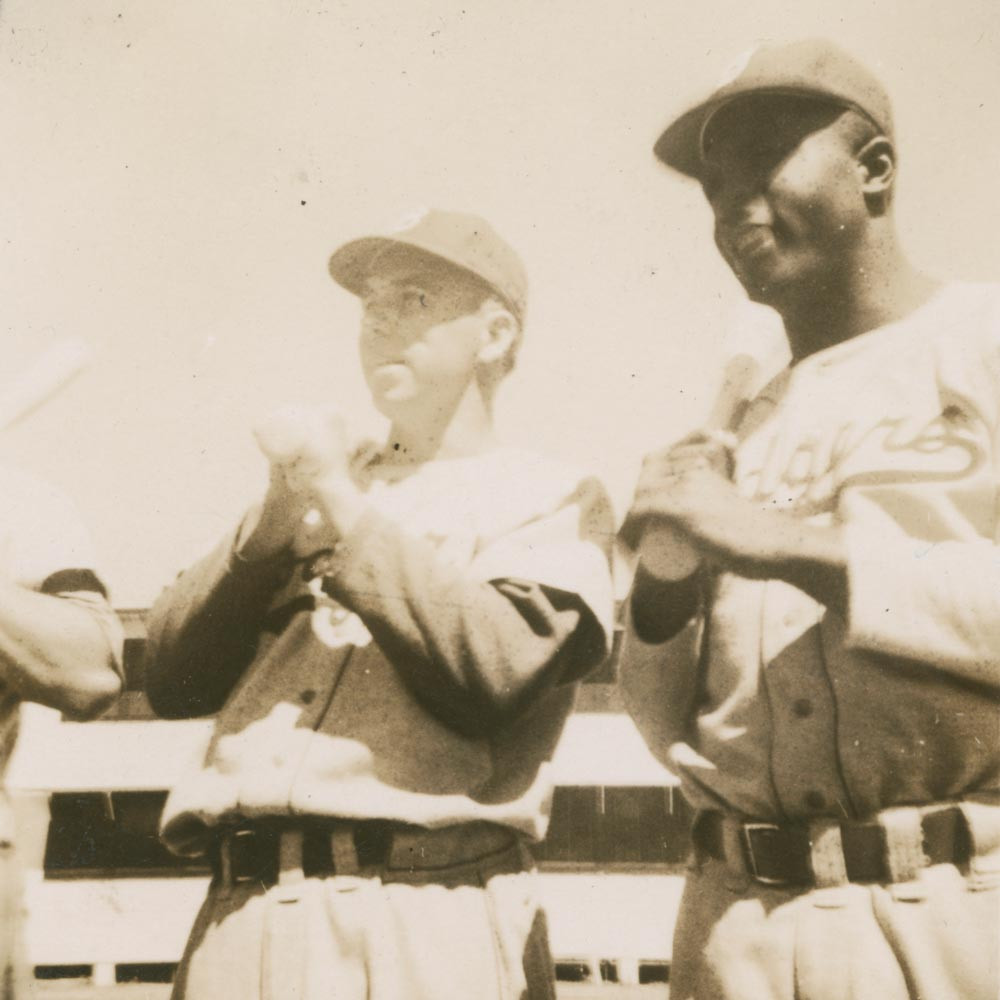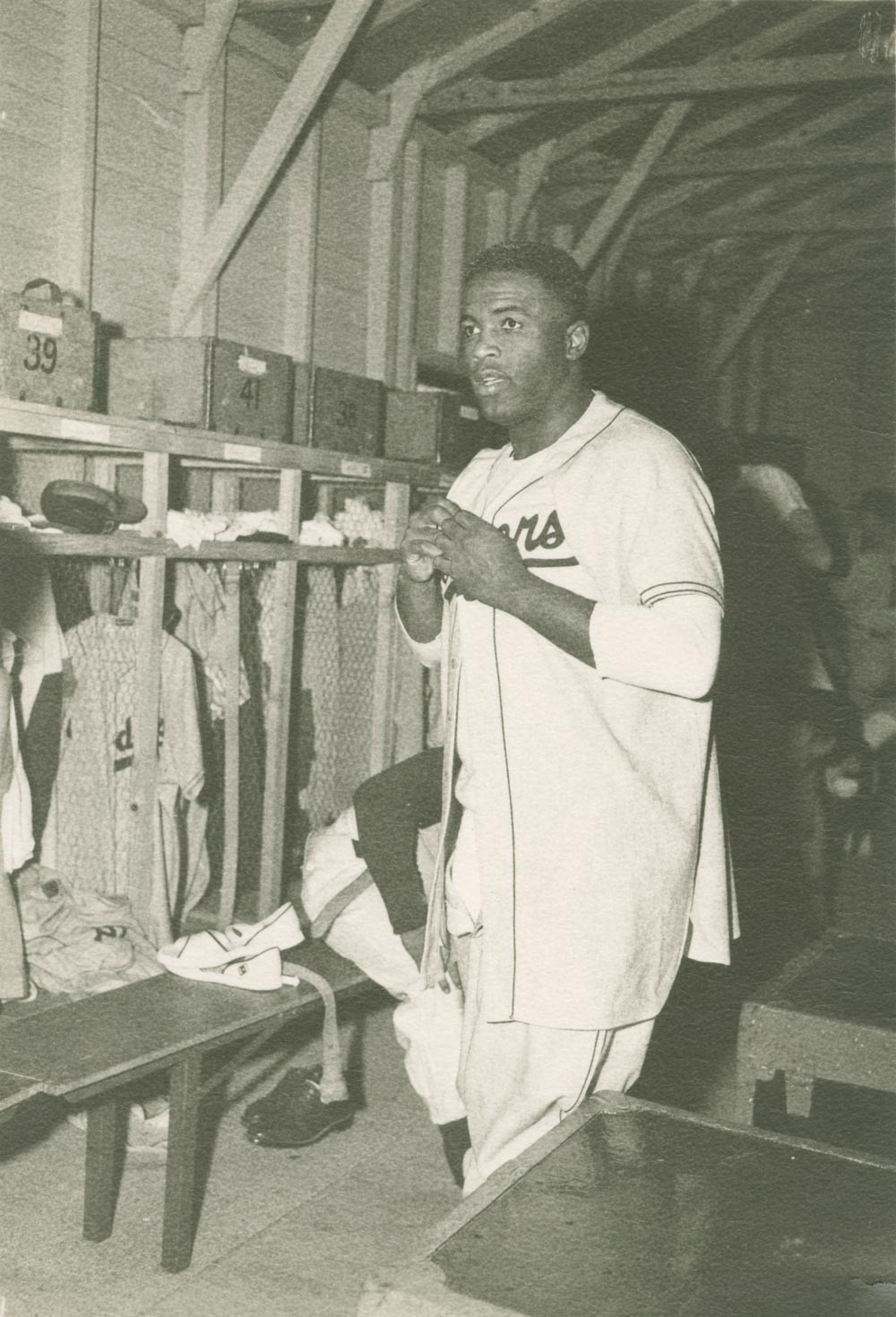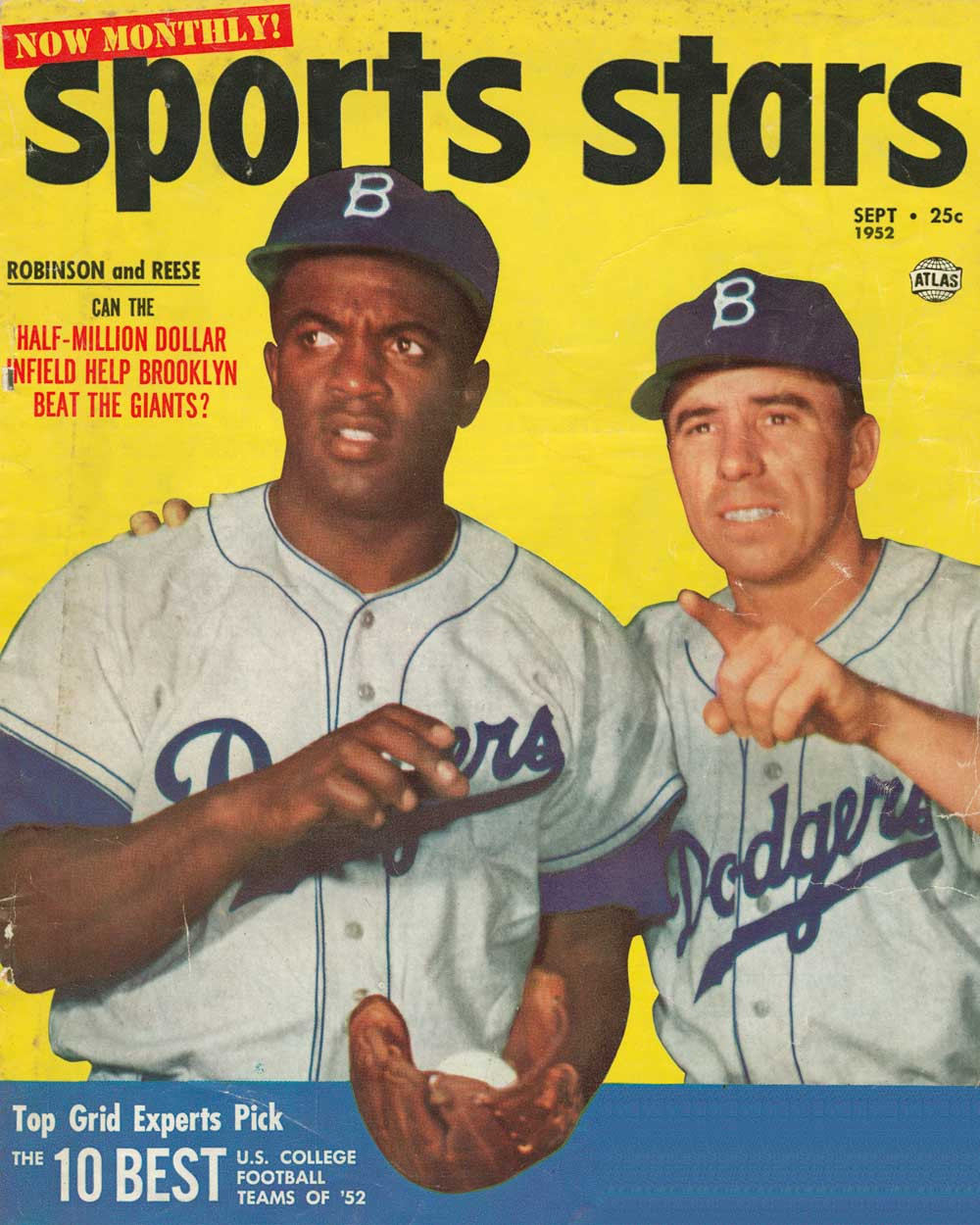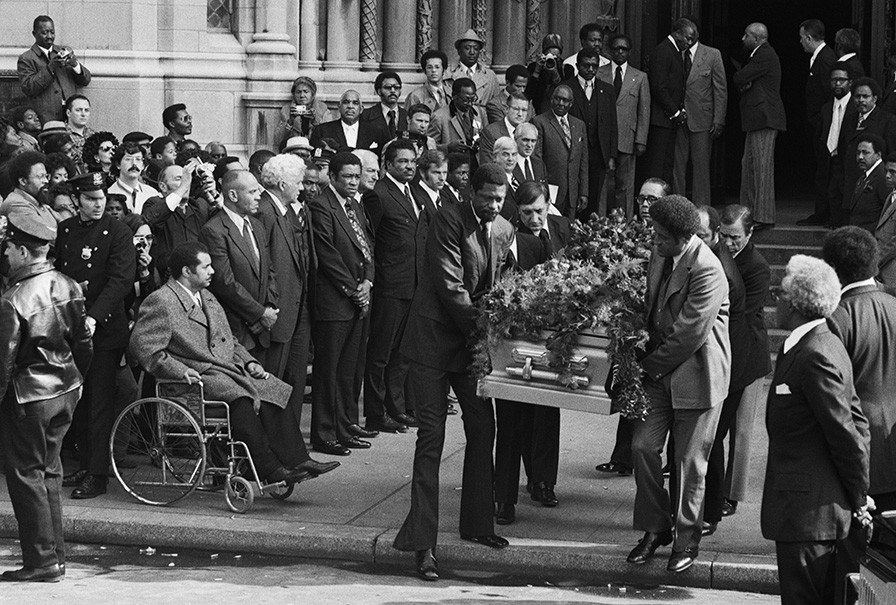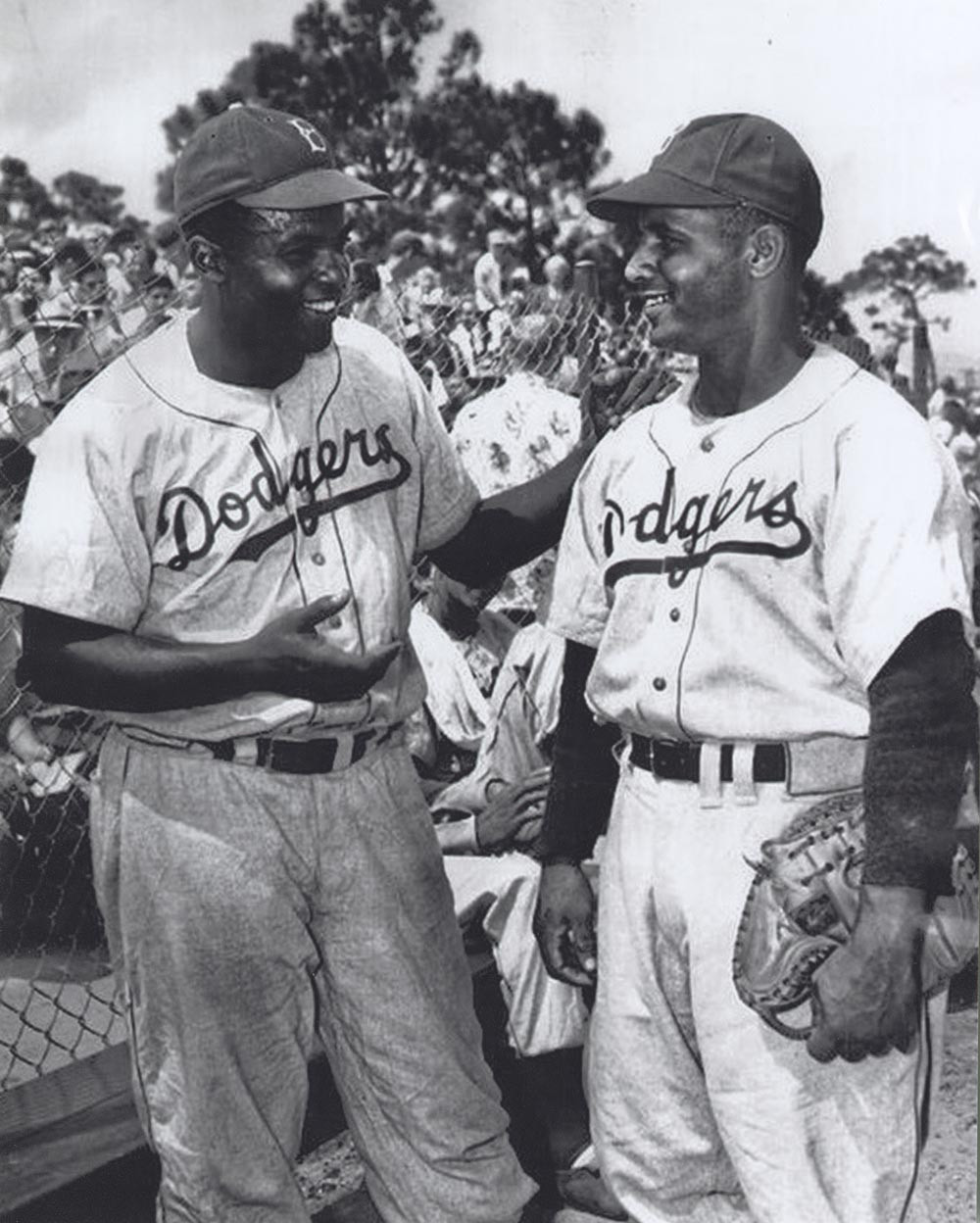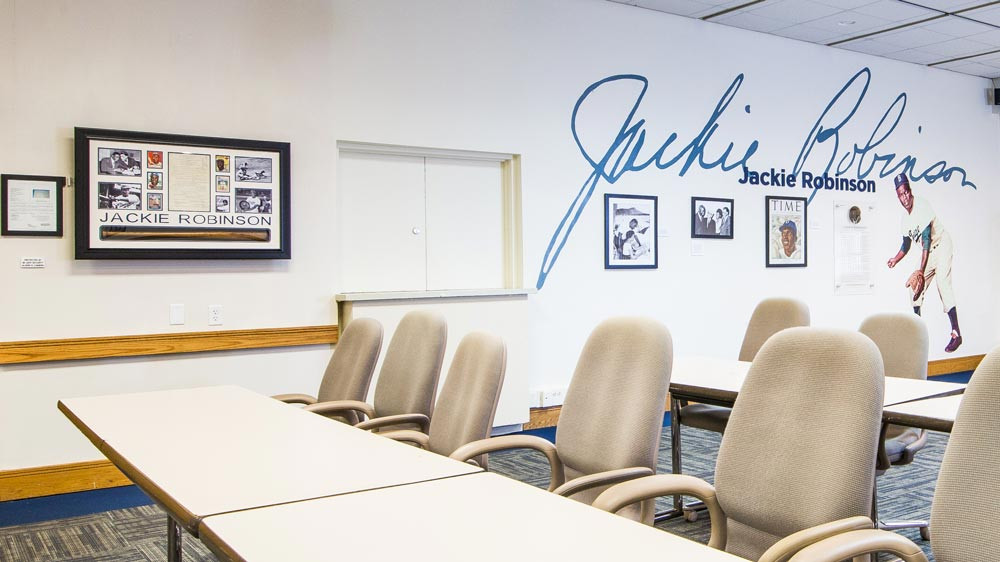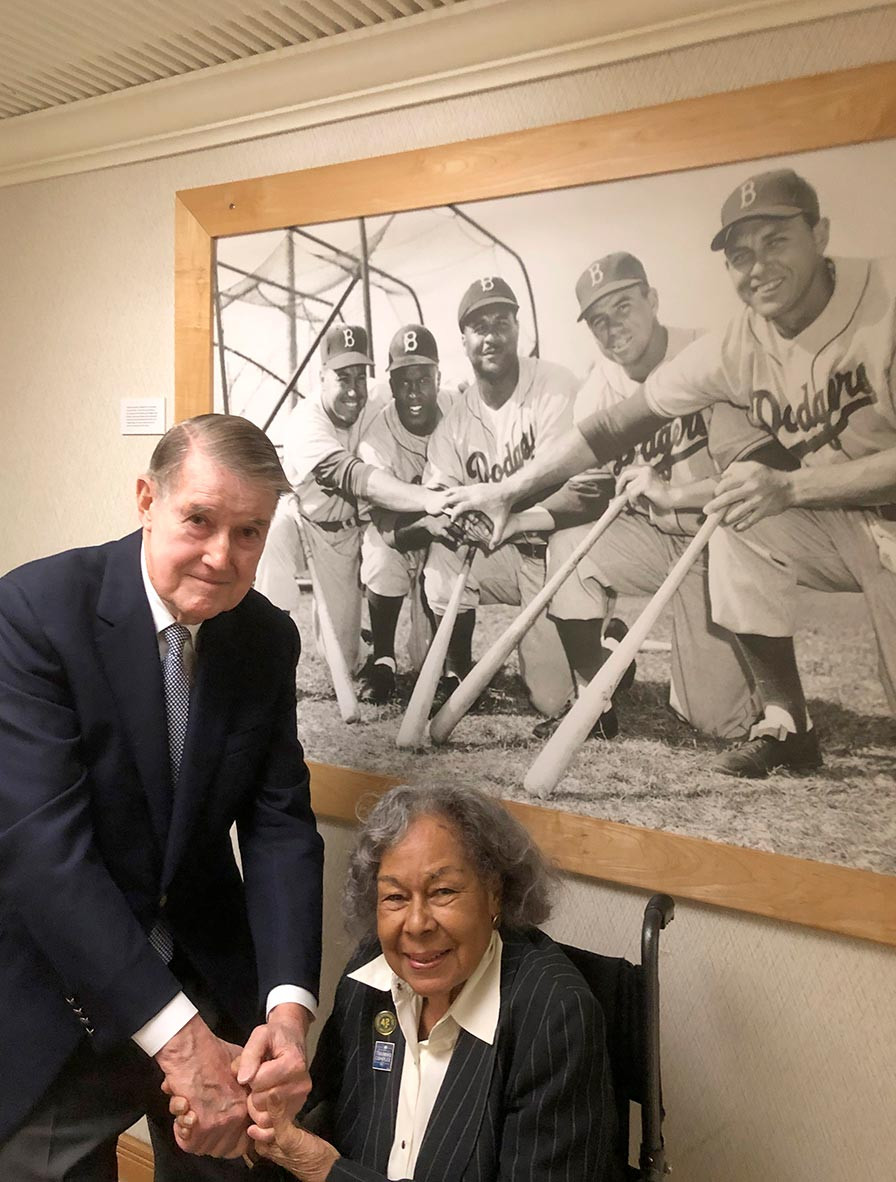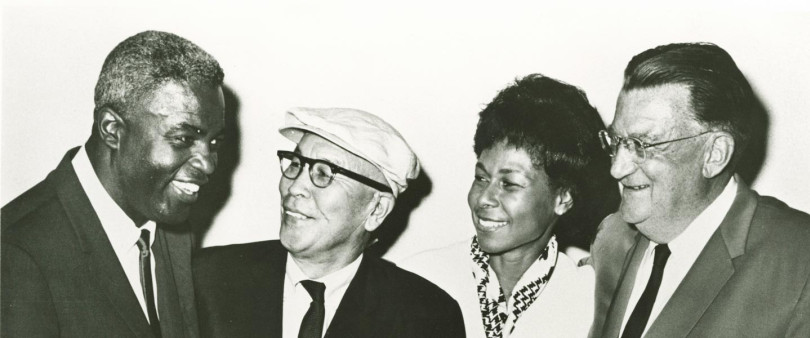
(L-R) Jackie Robinson; Sotaro Suzuki, Japan Baseball Hall of Fame reporter; Rachel Robinson; Walter O’Malley. Jackie and Rachel Robinson renew an acquaintance of theirs from the Dodgers’ 1956 Goodwill Tour trip to Japan. Suzuki, a member of the Japan Baseball Hall of Fame, provided support to the Dodger team on the trip, and now they meet again in March, 1965. Robinson was in Vero Beach preparing for a rehearsal game as a baseball commentator for ABC-TV and Suzuki had been invited to Spring Training to Historic Dodgertown by O’Malley.
Feature
Jackie Robinson and the O’Malley Family
While providing opportunities for all and advancing integration, the Jackie Robinson and O’Malley families have interacted for nearly 80 years.
As the first African American to play in Major League Baseball as a member of the Brooklyn Dodgers, Robinson is celebrated not only as a Hall of Fame player, but as an active force for social change, acceptance and inclusion. Playing for the Dodgers from 1947-1956, Robinson overcame bitter racial taunts and death threats on and off the field, but succeeded by not fighting back, except with his bat and glove. But, he was quick to point out any injustices for the cause of eliminating them. An American hero, Robinson’s uniform number 42 is retired throughout all MLB, honoring his legacy as “the first.” Walter O’Malley was Dodger Vice President and Secretary, a 25 percent stockholder and ownership partner with then Dodger President Branch Rickey, John L. Smith and James and Dearie Mulvey at the time of Robinson’s initial signing.
It was at Dodgertown – Vero Beach, Florida, the former Naval Air base which needed to be reconfigured to accommodate spring training activities, that everyone in the Dodger organization was brought together during a critical time of the year. Robinson and subsequent African American players would all eat, sleep and play together at the campus-like base. Dodgertown was Major League Baseball’s first integrated spring training camp in the South, where 600-plus players from the Dodgers and their minor league teams all lived together.
Starting in 1954, O’Malley also privately built golf courses (initially a pitch-and-putt) at Dodgertown, so that all players could enjoy recreational opportunities, as local courses were private and segregated. O’Malley privately built a 9-hole course, followed by an 18-hole course to benefit all players during their leisure hours. In 1962, Dodgertown Director Peter O’Malley, who was running the spring training camp, integrated the seating areas and other facilities at Holman Stadium at Dodgertown, the ballpark that Walter O’Malley privately built and opened in 1953. This action, while not particularly popular under Jim Crow laws, took place seven years before the local schools became integrated in Vero.
Following in his father’s footsteps, Peter O’Malley, President, Los Angeles Dodgers, 1970-1998, continued the relationship with Robinson and his wife, Rachel. In 1972, with Jackie and Rachel present, the Dodgers retired Robinson’s uniform number 42. Peter has served on the Jackie Robinson Foundation Board of Directors for more than 30 years, assisting with fundraising for college scholarships and now the development of the Jackie Robinson Museum. At the former Historic Dodgertown and now the Jackie Robinson Training Complex, the street leading into the complex is named “Jackie Robinson Avenue”. In 2014, under O’Malley’s leadership, the Conference Center’s largest meeting room at Historic Dodgertown was named in Robinson’s honor and rebranded with photos and memorabilia.
The following chronology lists many of the interactions between the Robinson and O’Malley families:Sep
October 23, 1945
Jackie Robinson signs a minor league contract to play the 1946 season with the Montreal Royals, the Brooklyn Dodgers’ top farm club in the International League. At the time of his signing, Branch Rickey was Dodger president and co-owner, while other partners and equal stockholders who supported his signing included Walter O’Malley, John L. Smith and James Mulvey (on behalf of his wife, Dearie).
April 11, 1947
Jackie Robinson becomes the first African American player to sign a major league contract, as he signs with the Dodgers at 215 Montague Street, Brooklyn.
April 15, 1947
Jackie Robinson becomes the first African American player in Major League Baseball when he made his debut for the Dodgers at Ebbets Field, Brooklyn playing first base.
March 31, 1948
With all the pomp and circumstance for their first major league exhibition game at Dodgertown, Vero Beach, Florida, the Dodgers defeated Montreal, 5-4, as Jackie Robinson homered in the first inning. The historic event meant the Dodgers were the first team in Major League Baseball to integrate in the South, as all the players lived together at Dodgertown, even as Jim Crow laws governed in the South. Florida Governor Millard Caldwell threw the ceremonial first pitch at so-called “Ebbets Field No. 2.” A sign reading “You Are Now Entering Dodgertown” welcomed a strong showing of some 6,000 fans, paying $1.25 in the grandstands and bolstered the idea of more games being played on base in the future. The Vero Beach Press-Journal, April 2, 1948
May 11, 1950
Walter O’Malley jots in his personal appointment book, “Jackie Robinson Story — Preview” at “The Preview Theatre, 1600 Bway — 9th Floor”. O’Malley archive, Walter O’Malley 1950 appointment book, May 11 “The Jackie Robinson Story” movie opened in 1950 and starred Robinson as himself, Minor Watson as Dodger President Branch Rickey and Ruby Dee as Robinson’s wife, Rachel.
October 30, 1950
Walter O’Malley was quoted in the Old Scout Column by Herbert Goren in the New York Sun: “Prejudices have no place in our society – and certainly not in sports.” Old Scout Column by Herbert Goren, New York Sun, October 30, 1950
February 4, 1951
Jim McCulley of the New York Daily News writes Jackie Robinson signed his 1951 contract for $37,000, making him the highest paid Brooklyn Dodger in the team’s history. Robinson made his major league debut in 1947, and after only his fourth full season, the Dodgers agreed to terms with him for the team record amount. Robinson said, “I’m very happy with my contract. There was never any question about my signing. I’m more interested in my future than I am in this year’s salary. I had a long talk with Mr. O’Malley about what Jackie Robinson is going to do in 1954 and 1955, not about 1951.” Robinson was asked about a future managerial role and he replied, “Not that. I’m interested in welfare work, radio, and things like that. I just want some advice from Mr. O’Malley.”
March 22, 1951
The Montreal Standard reports that Walter O’Malley offered Jackie Robinson a managerial job with the Royals of the International League “when his playing days are over.” O’Malley was quoted in the article, “Jackie told me that he would be delighted and honored to tackle this managerial post. He told me that he always held a soft spot in his heart for Montreal and so do I.” Robinson responded to O’Malley, “It’s like a wonderful dream.” Montreal Standard, March 22, 1951
May 9, 1951
Walter O’Malley is quoted in The Sporting News, “I have no reason to be dissatisfied with Jackie Robinson, his conduct on the field, or his spirit…He has the full support of this organization.” This comment was in response to National League President Ford Frick’s remarks that he was “tired” of Robinson “popping off, and all that business.” The Sporting News, May 9, 1951
May 1952
When Jackie Robinson was embroiled in a controversy in which it was charged that he and other Dodger players had taunted and made ethnic slurs at umpire Frank Dascoli, it was Walter O’Malley who came to Robinson’s defense by writing a letter to newly-elected National League President Warren Giles. Giles responded in writing to O’Malley. According to “Jackie Robinson, A Biography,” by Arnold Rampersad in 1997, O’Malley said, “I am satisfied that the matter is ended and that Jackie Robinson did not address anyone in uncomplimentary terms.” Ibid., Page 246 and “42 Faith”, Ed Henry, 2017, Page 240
September 24, 1952
Jackie Robinson and his wife Rachel dine with Walter O'Malley at the September 24, 1952 National League pennant celebration at the Hotel Lexington in New York City. The pennant-clinching party had a Hawaiian theme which is why Rachel and Jackie are wearing leis. Robinson was the highest paid player on the Dodger club because of his significant contribution to the Dodgers’ success.
December 3, 1952
A note in Harold C. Burr’s column in the Brooklyn Eagle about the Baseball Owners’ Meetings in Phoenix: “President Walter F. O’Malley flew in from Brooklyn last night. Mr. O’Malley brought up the recent television broadcast in which Jackie Robinson is alleged to have declared that the Yankee front office is discriminating against players of his race. “We have no feud with the Yankees,” said the prexy, “except from April to October.” Brooklyn Eagle, Harold C. Burr, December 3, 1952
December 17, 1952
Jackie Robinson makes it clear that he only desires to play for a team in New York. “If I am traded I’ll retire,” he said in The Sporting News. “I’ll play only in New York.” “‘I Will Play in New York or Nowhere,’ Says Jackie”, The Sporting News, December 17, 1952
March 11, 1953
Holman Stadium, Dodgertown, Vero Beach, Florida was dedicated on this date and Jackie Robinson started at second base, batting clean-up for the Dodgers. Robinson was 1-for-2 as the Dodgers beat the Philadelphia Athletics, 4-2. Walter O’Malley privately built Holman Stadium in just a matter of months.
November 17, 1953
Walter O’Malley writes a letter to Howard F. Klein, President, Acero, S.A., Mexico City, Mexico stating, “over the years Jackie Robinson has been big league in every respect.” “Jackie Robinson, A Biography,” Arnold Rampersad, 1997, Page 265 The letter was in response to Klein’s letter to O’Malley after Robinson played three games in Mexico on a barnstorming tour and praised Robinson’s “actions, his attitude, and his willingness of cooperation.” Ibid., Page 265
July 17, 1954
For the first time in Major League Baseball history, the majority of the starting lineup was diverse, as the Dodgers started Jackie Robinson at third base, Jim Gilliam at second, Roy Campanella as catcher, Sandy Amoros (Cuban) in left field and Don Newcombe as the pitcher.
January 12, 1955
Laurence C. Jones, Principal of The Piney Woods Country Life School, a boarding school for African American students, writes a letter to Walter O’Malley and E.J. Bavasi: “Dear Friends, I am glad to know you saw Ralph Edwards’ ‘This is Your Life’ program, and that you were inspired to help us reach a higher goal in the progress of Piney Woods School. With this contribution, you will assist us in a big way toward our efforts to educate those who seek to cultivate their intellectual faculties and distribute their knowledge in such a manner as to build a better world in which we may live. We are succeeding in doing this through our daily teaching of Christianity, Character and Service.” O’Malley sent a check for $500. He sent a note to Jackie Robinson which read, “Jackie – Thought you might like to see the attached. Please return for our files. Walter”. O’Malley archive, original letter, January 12, 1955
January 23, 1955
Jackie Robinson writes a handwritten letter to Walter O’Malley on Chicago’s Hotel Congress letterhead: “Dear My O’Malley: I am sure you must know I am on my tour with the National Conference of Christians and Jews and haven’t had a chance to see the mail that came for me. I talked with my wife this morning and she told me of the letter you sent and what you did in sending the check to Professor Jones for his schools and it made me feel very good. In my nine years in the organization I have been very proud of the job we all have done in promoting better understanding and have felt this pride in my many talks across the country. What you did increases my feeling for the organization and my respect for you, which I admit has waned some in the last few years. I know what you think of me from the talks we have had and some of the things you inferred but as you know I do not worry too much about what people think as long as my actions are honest. If you are honest in your feelings as I am in mine then I respect you for it. I am sure this is my last year in baseball and whether I spend it in the Dodger organization or elsewhere I hope we get a chance to know each other. I am not sure I know you but I know you do not know me or what I have tried to do. No one knows better than me that I have made mistakes but as in my baseball playing as long as I tried to do my best and as long as my efforts are honest and sincere I do not feel badly about them. There is still much to be done and I hope to do my part and God willing the many people who have helped in the past will continue to help. There is a chance this letter may not be understood but at least its (sp.) an honest effort. Sincerely, Jackie Robinson”. O’Malley archive, original letter, January 23, 1955
February 8, 1955
Writing an article “A Kentucky Colonel Kept Me In Baseball, Part II” in Look magazine, Jackie Robinson discusses two stories about Walter O’Malley: “I never hesitate to speak up about anything that’s on my mind. So I asked Dodger president O’Malley if he would ever set a limit on the number of Negro players. Mr. O’Malley told me that the club wouldn’t hesitate to put nine Negroes on the field if they were the best nine available players. On those days last summer when five Negroes appeared in the Brooklyn line-up, the one thing about it that impressed me most was the lack of comment. Here was a major-league club which had created a national uproar only eight years ago by signing one Negro. Now, its Negroes in some games outnumbered its white players, and nobody in the ballpark seemed to be giving it a second thought. I couldn’t help thinking that maybe democracy in the U.S.A. is doing better right now than many people are willing to believe.” Also, he wrote about O’Malley’s intervening at the Chase Hotel in St. Louis to accommodate African American players, who were banned from staying on the premises. “Partly because of the (lack of) air conditioning (at the all-Negro Adams Hotel) and partly because of the principle of the thing, I took up the Chase matter with Walter O’Malley, president of the Dodgers, last winter when I was signing my contract. He straightened it out, and the doors were opened to the Negro players in the spring. At first, I was the only one who went there. The other Negroes took a defensive attitude. If they weren’t good enough for the Chase for the past six years, they didn’t want to go there now. The way I look at it, if a hotel takes a ban off Negroes, the Negroes should go there for the sake of progress that’s being made in racial relationships. Later in the season, the other Negro players with the Brooklyn club changed their minds and moved to the Chase too.” Look magazine, “A Kentucky Colonel Kept Me In Baseball, Part II”, Jackie Robinson, February 8, 1955, Page 82
April 5, 1955
In an AP article, Walter O’Malley discusses his feelings about the Spring Training dispute between Dodger Manager Walter Alston and Jackie Robinson, who was not played in an exhibition game in Chattanooga, Tennessee. “‘Am I disturbed about all this feuding and fighting?’ O’Malley asked rhetorically. ‘I should say not. I’m delighted. I think it’s wonderful.’… ‘I’m glad to see my manager at the end of spring training blow his top. He needs to blow it once. Okay, let him. It’s a healthy sign. I’m also pleased that one of my veteran ballplayers is so keen to get in there and play that he blows his top when he’s left on the bench. The devil, I blow my top, too. It’s good to let off steam, and so I say, let ’em blow away.” Los Angeles Times, “Robinson Feud With Alston Delights Brooklyn’s Owner”, AP, April 5, 1955
July 17, 1955
The New York Times reported that Dodger President Walter O’Malley and Dodger star Jackie Robinson watch from the box seats at Ebbets Field as the Dodgers win a doubleheader from the Reds, 6-2 and 8-5. Robinson had a bruised left knee that kept him out of the lineup and the Dodger star and team owner sat together and enjoyed a double Dodger win. New York Times, William Broidy, July 18, 1955
October 4, 1955
The entire Dodger organization celebrates its first-ever World Championship in Brooklyn, as the Dodgers beat the New York Yankees, 2-0, in Game 7 at Yankee Stadium. Robinson played for pennant-winning teams in 1947, 1949, 1952 and 1953 before tasting the fruits of victory in the World Series. It is the first World Series roster by one team – the Dodgers – that had five minority players, including Jackie Robinson, Roy Campanella, Don Newcombe, Jim Gilliam and Sandy Amoros (Cuban).
November 13, 1956
Jackie Robinson drives in a run in his final Dodger at-bat as the Dodgers complete their 19-game Goodwill Tour of Japan in Fukuoka with a 14-4-1 overall record. It is the last time that Robinson was to wear his familiar No. 42 Dodger uniform. New York Times, “Brooks Criticized at End of Tour”, November 14, 1956
Following the 1956 season, Jackie Robinson had made arrangements to announce in an exclusive article in Look magazine in January 1957 that he was retiring from baseball to work as director of personnel for Chock Full o’Nuts. Robinson was unable to share this news to protect the release of the story in the magazine. Unaware of the agreement between Look and Robinson, the Dodgers consummated a Dec. 13, 1956 trade with the Giants, Robinson and pitcher Dick Littlefield being the principals. The Dodgers wanted to fulfil Robinson’s desire to play for another team in New York, if he could not play for the Dodgers, thus the trade with the Giants. Both the Dodgers and Robinson were miffed, as the Dodgers said a trade would not have been made if they had known about Jackie’s impending intentions to retire, while Robinson was upset that he was dealt to the rival Giants and panicked because he could not tell others he was about to retire. The story in Look was leaked Jan. 8, 1957. When the Robinson article in Look came out on Jan. 22, the Giants were still prepared to offer Robinson a contract, but by then Robinson had decided to voluntarily retire from baseball, invalidating the trade.
November 30, 1956
The Jersey Journal had an article on the prospects for the 1957 Brooklyn Dodgers season. Walter O’Malley spoke of Jackie Robinson and said Robinson was a “senior veteran,” whose place on the club would “depend on what he himself wants to do. If he wants to play, he will. If he doesn’t want to…he won’t and no amount of money will coax him. Whatever he does, I’ll tell you I’d like twelve guys like him on the team.”
January 22, 1957
“A lot of people will say I’m quitting because I was traded to the Giants last month. That isn’t true,” Robinson wrote in the January 22, 1957, edition of Look. “I started thinking about retiring from baseball almost four years ago, and have been looking around for the kind of job I wanted ever since. When it turned up a few weeks ago, I took it.” “42 Faith, The Rest of the Jackie Robinson Story”, Ed Henry, 2017, Page 228
January 23, 1957
An article about Robinson and his retirement from baseball in The Sporting News reports: “Branch Rickey, his best friend and sponsor, was fired as general manager of the Dodgers and subsequently sold his stock to Walter O’Malley and John L. Smith. ‘There isn’t enough room in this paper for me to tell what I think of Mr. Rickey,’ said Jackie. ‘Walter O’Malley knows that and he also knows nothing could change my mind about Mr. Rickey, although I was aware of their differences. Mr. O’Malley and I had our differences also, but we parted friends after a fine time with our families in Japan.’ O’Malley insists he never had an unkind word with Jackie, stressing he was always the first to come to his defense in all rhubarbs – even the many with National League President Warren Giles.” Michael Gaven, “Jackie Battled Rivals, Umps, Own Pilots”, The Sporting News, January 23, 1957
May 9, 1958
Speaking to the Newark Star-Ledger regarding the Dodgers playing in Los Angeles, their first season on the West Coast, Jackie Robinson said, “I root for them and wish them well.” Jackie Robinson, A Biography, Arnold Rampersad, 1997, Page 331
May 10, 1958
Jackie Robinson reacts to Walter O’Malley receiving the Urban League medal as a representative of the Dodgers, not personally, and tells AP, “I owe the man an apology. But, I do not apologize for saying that the club has deteriorated and that he, as president and owner, must take the blame. I’m now told that the medal was given to the club, not to O’Malley; I can’t quarrel with that but I do insist that O’Malley and Buzzie Bavasi, the general manager, should be blamed for the club’s deterioration. They have sold players they could use now. If they had brought new blood into the line-up the club wouldn’t be in seventh place. There must be something wrong somewhere. We won pennants, the club now is seventh.” Los Angeles Times, “Jackie Robinson Tempers Blast at Walter O’Malley”, AP story, May 10, 1958
June 1, 1958
In order to support the vote for Proposition B, a referendum before Los Angeles voters on the June 3 ballot, the Dodgers hold a live, five-hour Dodgerthon on KTTV Channel 11 in support of the contract negotiated by the city of Los Angeles and Dodger President Walter O’Malley. Jackie Robinson taped a segment encouraging support of the ‘yes’ vote on Proposition B for Baseball in Los Angeles. Many civic leaders, celebrities and sports stars participated and two days later, Proposition B passed in the city-wide vote. Los Angeles Times, “Five-Hour Dodgerthon Slated on KTTV Today”, June 1, 1958
February 18, 1959
Former Dodger President and owner Branch Rickey recalls the issues that were faced in the signing of Jackie Robinson to Dick O’Connor in The Sporting News: “Rickey recalled the six big problems before the Dodgers decided to sign Robinson as the first Negro in the major leagues. He listed them as follows: “(1) The ownership of the Brooklyn Dodgers. (At the time, Rickey, Walter O’Malley, John L. Smith and Dearie Mulvey were the equal owners of the Dodgers and all gave their support before Rickey continued in signing Robinson.) (2) Finding a man good on the field. (3) And off the field as well. (4) Public relations in travel, eating and lodging. (5) The Negroes themselves who might tend toward mass adulation and too much enthusiasm at games. (6) The other players on the Dodgers.” The Sporting News, “Women’s Club Hears Rickey Tell of Breaking Color Line”, Dick O’Connor, February 18, 1959
November 1, 1959
Mallie Robinson, National Chairman of the George Washington Carver Memorial Institute in Washington, D.C. and mother of Jackie Robinson writes a letter to Los Angeles Mayor Norris Poulson in regarding the delays and obstacles thrown at Dodger President Walter O’Malley to privately build Dodger Stadium: “My dear Mr. Mayor: The following is my personal opinion, partly based on the fact that Mr. O’Malley, as owner of the Dodgers, gave my son, Jackie, a chance to break the color line in baseball. Surely, Mr. O’Malley has brought the Dodgers to Los Angeles and for this he must receive full cooperation and active support. The actions of some officials border on the impolite, to say the least. Mr. Walter O’Malley has given Los Angeles an even brighter place in the sun. This man deserves all the help and consideration possible, which, to date, has not been accorded him. Delaying tactics on the part of some in high places does not, in my opinion, reflect the true spirit of cooperation in a civic venture that can bring nothing but good to all concerned. Let’s get behind Walter O’Malley! You have done a first-rate job for Los Angeles and her citizens for a good many years and we appreciate it. Please believe me, Most sincerely yours, Mallie Robinson, National Chairman, 133 Pepper Street, Pasadena, California”. O’Malley archive, Mallie Robinson letter (copy) to Los Angeles Mayor Norris Poulson, November 1, 1959
November 3, 1959
Walter O’Malley receives the George Washington Carver Supreme Award of Merit for “his outstanding contribution to sports, better race relations and human welfare”. The presentation was made at the University of Southern California by Mallie Robinson, the mother of Jackie Robinson and Dr. Rufus B. vonKleinSmid, USC Chancellor. As a 25 percent Brooklyn Dodger stockholder as well as club V.P. and General Counsel in 1945, O’Malley was involved in the approval process when Dodger President Branch Rickey signed Jackie Robinson, who became the first African-American to play in the majors in 1947. O’Malley said, “I take no credit for signing Jackie. Branch Rickey signed Jackie, as everyone knows — but with the complete approval of the Dodger stockholders.” After taking the reins as Dodger President in 1950, O’Malley continued the integration of the ballclub. Los Angeles Examiner, November 4, 1959
January 23, 1962
Upon Jackie Robinson’s election in his first year of eligibility to the National Baseball Hall of Fame, Dodger President Walter O’Malley said, “The Dodgers are mighty proud that Jackie Robinson has been named to baseball’s Hall of Fame. Robinson and (Cleveland pitcher) Bob Feller richly deserve the honor that has been bestowed upon them. We’d like to have them both on our team right now.” Los Angeles Times, “Jackie Rates Honor, Says Dodger Boss”, January 24, 1962 Since the initial 1936 Hall of Fame election, no first-year candidate had been elected until Robinson and Feller both made it to Cooperstown on their first ballot as selected by the Baseball Writers’ Association of America (BBWAA).
May 22, 1962
Jackie Robinson writes a letter on his Chock full o’Nuts stationery to A.E. “Red” Patterson, Dodger P.R. man: “Dear Red: Thanks for your offer to visit the park and attend a game or two. My visit on this occasion did not permit my accepting your offer. If I may, I will take a raincheck and the next time, I will take you up on your offer. Please extend my thanks to Mr. O’Malley and Buzzie. It was nice of them to have you check with me. Sincerely, Jackie” O’Malley archive, Jackie Robinson original letter, May 22, 1962
July 23, 1962
Jackie Robinson is inducted to the National Baseball Hall of Fame in his first year of eligibility, becoming the first African American to enter the Hall in Cooperstown, NY. In his 10-year career with the Dodgers, he was named Rookie of the Year (1947), National League MVP (1949) and was a six-time N.L. All-Star. He stole home 19 times in his career. Attending the Hall of Fame induction ceremonies were Kay O’Malley and Peter O’Malley.
July 25, 1962
Jackie Robinson writes a letter to Walter O’Malley: “Dear Mr. O’Malley: - Sunday night, as I had dinner with my family at the Otesago (sp.) Hotel in Cooperstown, I had the opportunity of chatting with Mrs. O’Malley briefly. We talked about things I am sure she does not remember, but I really wanted to talk with her about you and I. I couldn’t help but feel sad by the fact that the next day I was entering the Hall of Fame and I did not have any real ties with the game. I thought back to my days at Ebbetts (sp.) Field, and kept wondering how our relationship had deteriorated. Being stubborn, and believing that it all stemmed from my relationship with Mr. Rickey, I made no attempt to find the cause. I assure, you, Rae has on many occasions discussed this, and she too feels we should at least talk over our problems. Of course, there is the possibility that we are at an impasse, and nothing can be done. I feel, however, I must make this attempt to let you know I sincerely regret we have not tried to find the cause for this breach. I will be in Los Angeles on Friday. If you feel you have about fifteen minutes, I’ll drop by. I shall call your office when I arrive. Sincerely yours, Jackie Robinson”. O’Malley archive, Jackie Robinson original letter, July 25, 1962
July 26, 1962
Walter O’Malley sends the following telegram to Jackie Robinson: “Thanks for letter. Leaving for San Francisco today-back Monday. Delighted to see you any time. Best Rachel and all. Walter F. O’Malley” O’Malley archive, Walter O’Malley telegram (copy), July 26, 1962
July 28, 1962
Dink Carroll of the Montreal Gazette wrote, “Buzzie Bavasi, general manager of the Los Angeles Dodgers told Jimmy Cannon of the N.Y. Journal-American that Jackie Robinson was the highest paid player the Dodgers have ever had.” He added: “And Walter O’Malley paid him twice as much as Branch Rickey did during his great years.”
July 31, 1962
Jackie Robinson writes a letter on his Chock full o’Nuts stationery to Walter O’Malley: “Dear Mr. O’Malley: I am sorry to have missed you on the trip. I do not know when we will have a chance to see you, but we are looking forward to it. Sincerely yours, Jackie” O’Malley archive, Jackie Robinson original letter, July 31, 1962
August 14, 1962
Walter O’Malley writes a letter to Jackie Robinson: “Dear Jackie: Thank you for your note on your return to New York. By all means see me any time you are here. Over the years your Mother and I have kept an active correspondence and occasionally she comes in to visit me. We have tried to be helpful. She has recently written me about Mack who has been on the payroll here at the stadium – not in the best of jobs but the heck of it is that all the staff in this stadium come from a labor pool and we still have not found a way to do much about it as we are under contracts with each of the several labor union trades involved. Incidentally, the last letter from your Mother on August 3rd, was about as sweet as anyone could receive from a fine lady. If you want to see it sometime I would be pleased to show it to you and I know she would not object. Best wishes to Rachel as well. Sincerely, Walter F. O’Malley” O’Malley archive, Walter O’Malley letter (copy), August 14, 1962
August 16, 1962
Jackie Robinson writes a letter to Walter O’Malley on Jackie Robinson stationery: “Dear Sir: I am very pleased over your letter and am honestly sorry we have not been able to sit down and discuss our differences. Differences, I feel certain would be solved if we find out what they really are. My mother has been telling me of her interest and how friendly everyone is. She is really a fine person, but I am certain you know her concern is for her children, and sometimes requests are a bit out of the question. I don’t have any immediate plans to be in California, but please be assured I am looking forward to a meeting with you. Raechel (sp.) sends her regards. I told her of my letter and she was very pleased. Give my regards to Mrs. O’Malley and the family. Sincerely yours, Jackie” O’Malley archive, Jackie Robinson original letter, August 16, 1962
August 20, 1962
Walter O’Malley writes a letter to Jackie Robinson: “Dear Jackie: Thank you for your follow up letter of the 16th. Why not get out of your mind that we have any ‘differences’. By all means budget your time to spend a few hours with me when you next get to California. Sincerely, Walter F. O’Malley, President” O’Malley archive, Walter O’Malley letter (copy), August 20, 1962
September 1, 1962
Jackie Robinson writes in the Chicago Defender: “There have been a lot of strange and untrue things written about the ‘situation’ between Walter O’Malley and myself. Doc (Young, a sportswriter) refers to a ‘feud’ between us. In our opinion, there has never really been a ‘feud’ between us. There were some natural misunderstandings and differences of view which came about beginning with the time O’Malley took over the Brooklyn Dodgers from Branch Rickey….Recently, when we were on the West Coast, we got a message to O’Malley that we would like to have a meeting with him and a frank, man-to-man talk. Contrary to what others think, O’Malley seems just as interested in a talk as we are. Immediately, we received a warm and gracious answer in which he invited us to have a get-together…..The truth is not that we are feuding but that two guys in the game—one still in and the other retired—have had differences and that both of us want to talk to each other about those differences.” Jackie Robinson, "Jackie Robinson says:", Chicago Defender, September 1-7, 1962
September 20, 1963
Rachel and Jackie Robinson are the invited guests of Kay and Walter O’Malley in the President’s Box at Dodger Stadium. The visit was the first ever made by Rachel and Jackie to Dodger Stadium. The Dodgers behind pitcher Don Drysdale shut out the Pittsburgh Pirates, 2-0. The deciding run in the game occurred when Tommy Davis stole home, a feat done by Robinson 19 times in the regular season and once in the 1955 World Series. After the win, the Dodger Hall of Famer visited the Dodger clubhouse and greeted his former teammates Drysdale, Jim Gilliam, Sandy Koufax, and Johnny Podres. Jack Protay, Daily Breeze, September 21, 1963 The win coupled with a St. Louis Cardinal loss gave the Dodgers a five-game lead with eight left to play. In the clubhouse, Robinson said, “You guys have done a great job. A fantastic job. I’ll see you in New York (to play the Yankees in the World Series)…you’re all right now.” Associated Press, September 22, 1963
May 22, 1964
Los Angeles Times’ columnist Sid Ziff writes about Robinson, “He told me the feud with Walter O’Malley is a thing of the past.” He quotes Robinson: “I feel Mr. (Branch) Rickey is one of the great human beings. It was because of my love and admiration for him that I had my difficulty with Mr. O’Malley. That is the only thing that caused the resentment. I’m glad our relations have been ironed out.” Regarding his retirement following the 1956 season, Robinson said, “My legs were gone. They were so bad I couldn’t have played even if I had wanted to. I had already damaged one leg and later it was almost to cost me my life. There were five days, when I was operated on, that they thought I wouldn’t pull through.” Ziff wrote Robinson was very instrumental in Tommy Davis signing as a free agent for the Dodgers. (Davis led the National League in batting in 1962 and 1963). He wrote, “Jackie (Robinson) had a hand in signing Tommy Davis for the Dodgers. “He (Davis) was leaning towards the Yankees,” said Robinson. “Al Campanis asked me to talk to him (Davis). I thought he’d get a better break with the Dodgers. I gave his mother a good pitch, too. I think it’s been proven I was right.” Los Angeles Times, “Robinson Talks Shop”, Sid Ziff column, May 22, 1964
July 19, 1964
Sid Ziff writes in the Los Angeles Times about Dodger Vice President Fresco Thompson’s book, “Every Diamond Doesn’t Sparkle”. Ziff writes, “His book, ‘Every Diamond Doesn’t Sparkle,’ is something of a surprise. You knew it would be funny because Fresco is famous for his sense of humor. But Fresco also lashes out at people. He is startlingly outspoken. For instance, he says Branch Rickey should have shared the credit for bringing Jackie Robinson into organized baseball. ‘While it might have been Rickey’s original idea to find a place for Robinson on the team, he was only a 25% stockholder in the (Dodger) organization. The move would not have been possible without the permission of other stockholders: Walter O’Malley, Jim Mulvey and John Smith.’” Los Angeles Times, “Fresco the Author,” Sid Ziff column, July 19, 1964
October 8, 1964
Writing in the Los Angeles Sentinel, L.L. “Brock” Brockenbury mentions that Jackie Robinson and O’Malley may have had differences during Jackie’s playing days for the Dodgers, but “Robinson and President O’Malley are on friendly terms now.” Los Angeles Sentinel, “Far Reaching Step,” L.L. “Brock” Brockenbury column, October 8, 1964
1964
In Jackie Robinson’s 1964 autobiography, “Baseball Has Done It”, he writes, “I personally did not think Mr. O’Malley was as liberal in his thinking on integration as Mr. Rickey. I have grown to respect him a great deal in recent years and my wife has a sincere affection for him and Mrs. O’Malley. Today I sometimes am annoyed at criticism that is heaped his way. I must admit, however, I used to be his severest critic. There have been many changes and many more Negroes on the Dodgers since I retired. Mr. O’Malley has finally absorbed the idea that the Negro must be recognized on merit alone, if not for more socially significant reasons.” He also writes about Dodgertown, “Joe Black and I worked out with the Dodgers’ Fort Worth team for a few days in Vero Beach one spring, but there were no Negroes in the Texas League then, so we were transferred to Montreal under Walter Alston. Jackie Robinson and Roy Campanella were the camp leaders at Vero. They were Negroes like me and their presence reassured me. As for the club, no one spoke to us about being Negro; all they wanted us to do was to play ball...no one talked about discrimination, and at that age I never thought about it. I thought baseball. Now, in Vero, I heard about discrimination in the town. But we were five miles away. We had our own cafeteria and didn’t have to go to restaurants.” “Baseball Has Done It”, Jackie Robinson, 1964, Pages 160, 162
March 31, 1965
Hall of Famer Jackie Robinson returns to Dodgertown – Vero Beach, Florida as a broadcaster for ABC Sports. Robinson is the first African American to be an analyst for the MLB Saturday Game of the Week telecasts on ABC that season. According to The Sporting News, “‘Isolated cameras’ and ‘stop-action’ shots are just two of the innovations which fans will be able to enjoy. The Cardinal-Dodger exhibition game at Vero Beach was a trial run of the new techniques.” The Sporting News, “ABC-TV Unveiling New Techniques for Game”, April 17, 1965
July 2, 1965
Jackie Robinson writes a letter to Walter O’Malley: “Thank you for helping to make the Jackie Robinson Day (June 16, 1965) a big success, at least for my family. Red Patterson was of great help and we feel his know how made things fit better into place. I am told everyone considered the day a success; much of it was due to your cooperation. Rachel sends her best wishes and thanks as well. Regards to Mrs. O’Malley and the family. Sincerely yours, Jackie” O’Malley archive, Jackie Robinson original letter, July 2, 1965
July 15, 1965
Walter O’Malley writes a letter to Jackie Robinson, Chairman, Freedom National Bank of New York: “It was thoughtful of you to write to me and I do appreciate it. I have been in and out of town a great deal and Mrs. O’Malley is now in New York but I know she will want to see your letter. Give Rachel our very best” O’Malley archive, Walter O’Malley letter (copy), July 15, 1965
September 6, 1965
In one of his rare appearances at Dodger Stadium, Jackie Robinson works a baseball Game of the Week broadcast for ABC Sports, along with Chris Schenkel and Leo Durocher, as the Dodgers played the San Francisco Giants. The Sporting News, “Dodger-Giant Game Sept. 6 Will Be on Nation-wide TV”, September 4, 1965 Don Drysdale started for the Dodgers against the Giants’ Warren Spahn.
1965
In his book “The American Diamond”, Branch Rickey writes, “The first major problem in breaking the color line was ownership. In St. Louis in 1942 and even later, a Negro was not permitted as a paid spectator to sit in the grandstand. The ownership of Brooklyn at the first meeting in New York approved Negro employment. That was a new day for ownership in professional baseball…” “The American Diamond, A Documentary of the Game of Baseball”, Branch Rickey with Robert Riger, 1965, Page 45
1965
In “The Old Ball Game” film about the history of baseball, as told by Branch Rickey, he said, “Now here’s (Jackie) Robinson coming into the picture, the first ‘colored’ fellow that ever came in, belatedly. The very first move I made when I came into Brooklyn was to investigate the first problem of the six that faced me in the employment of the Negro and that was the approval, the support of ownership. I couldn’t do anything without ownership being back of it and I didn’t own any part of it at that time. When this chap came into the picture and I got ownership back of it, I said, ‘What are the prospects of successfully doing it?’ I was convinced then that there was a time limit about it. After waiting 100 years, these people legally free, not spiritually free, never morally free, we all know it now, what’s happened the last 15 years, we all know that now there was a need for it. I felt it was the right man.” “The Old Ball Game as told by Branch Rickey” film, 1965
May 22, 1968
Walter O’Malley writes a letter to Jackie Robinson: “This morning’s Los Angeles Times carries a short note on the passing of your Mother. Over the years we have had occasion to show interest in a matter that was dear to her heart. I do wish to extend to you and Mack our sympathy at losing a fine lady.” O’Malley archive, Walter O’Malley letter (copy), May 22, 1968
November, 1968
A.S. “Doc” Young wrote a feature for Ebony magazine where he stated the responsible Dodger ownership who signed Jackie Robinson. “Following lengthy discussion, the (Dodger) board of directors approved Rickey’s ideas and plans, including the scouting of Negro players. Among those affirming these plans and ideas was Walter O’Malley, who was later to become president and principal owner of the team and the man most responsible for major league’s invasion of the West Coast. All members of the board pledged themselves to secrecy about the “Negro facet” of the new Dodger program….”
March 28, 1970
In an effort to memorialize the legacy of Dr. Martin Luther King, Jr., Major League Baseball, the Dodgers and the Southern Christian Leadership Conference held an exhibition game at Dodger Stadium before a crowd of 31,694. Although MLB and the Dodgers were preparing to do that in Fall 1968-early 1969, the SCLC decided more time was needed for planning and the SCLC leadership asked if the game could be delayed until the following spring.
The Martin Luther King, Jr. East-West Major League Baseball Classic featured top major league players, two each from the 24 National and American League teams. In fact, according to Sports Illustrated in its 2021 account of the game, headlined “The Greatest (Forgotten) Game Ever Played: MLB’s 1970 Exhibition to Honor MLK”, “At least 23 current and future Hall of Famers were in uniform that day.” The Los Angeles Times reported, “…on the sidelines, out of uniform, was a pigeon-toed man with gray hair, a man named Jackie Robinson.” Dwight Chapin, “King Game Great – Even for Losers”, Los Angeles Times, March 29, 1970 Coretta Scott King threw the ceremonial first pitch and the East beat the West on Ron Fairly’s home run, 5-1. Walter O’Malley and Peter O’Malley were instrumental in offering support – from staff and hosting the game, while keeping expenses at a minimum. The SCLC was the beneficiary of the game’s net proceeds and reported more than $30,000 to help construct the Martin Luther King, Jr. Memorial Center in Atlanta. Bill Francis, “1970 game honored legacy of Martin Luther King Jr.”, baseballhall.org
June 7, 1971
Jackie Robinson writes a letter on his Freedom National Bank of New York letterhead to Peter O’Malley: “I am sorry I could not attend Sunday, I am sure you are aware of my reasons, therefore I shall not go into them. I am pleased to see baseball is turning to younger executives, perhaps this move will effect a change and the sport will move as it did in the first forties. There should be more concern about the future of the games Black stars and a place in baseball for those who have made a contribution, and have the ability. Perhaps we can chat sometimes (sp.). Yours Sincerely, Jackie.” O’Malley archive, Jackie Robinson original letter to Peter O’Malley, June 7, 1971
May 21, 1972
Charles Maher of the Los Angeles Times profiled Walter O’Malley and wrote of O’Malley’s direct involvement to break the color line in baseball. “One of O’Malley early assignments with the Dodgers (1943) was to sign a Cuban, Silvio Garcia, who would have been the first black in organized baseball. But when Walter flew to Cuba, he found Garcia had been drafted.” Jackie Robinson signed his first pro contract with the Dodgers on October 23, 1945. Maher continued, “In his (Jackie Robinson) book, ‘Baseball Has Done It,’ Robinson wrote, ‘The change in ownership from Mr. Rickey to Walter O’Malley…made little if any difference in the club’s overall attitude toward Negroes…I have grown to respect him (O’Malley) a great deal in recent years and my wife has a sincere affection for him and Mrs. O’Malley.’”
June 4, 1972
Walter and Peter O’Malley hold uniform retirement ceremonies during Oldtimers’ Day at Dodger Stadium to honor Jackie Robinson (42) and teammates Roy Campanella (39) and Sandy Koufax (32). Robinson told the crowd, “This is truly one of the greatest moments of my life.” Robinson also met with Peter O’Malley at Dodger Stadium and Robinson told an L.A. Times reporter, “I told Peter I was disturbed at the way baseball treats its black players after their playing days are through. I was very much impressed by Peter’s attitude. I don’t know what he can do about it, but first of all there has to be sensitivity to it.” Los Angeles Times, “Jackie Robinson Seeks and Finds Sensitivity”, Ron Rapoport, June 5, 1972
June 5, 1972
Writer Ron Rapoport quotes Jackie Robinson in a Los Angeles Times’ article: “The problem was never between Jackie Robinson and Walter O’Malley,” said Jackie. “It was between Walter O’Malley and Branch Rickey…. When Mr. Rickey left the club, there were real problems between me and Mr. O’Malley based on my relationship with Mr. Rickey. ” Ibid.
June 8, 1972
Jackie Robinson writes a letter to Dodger President Peter O’Malley: “Dear Pete: As I review the memorable events of last Sunday, I still question whether or not I was able to truely (sp.) express my emotions to you and the fans. However, I want you to know that I was never so moved by the response of the fans as on that day. Without doubt, you must be aware that I considered the Brooklyn Dodgers’ fans as the greatest ever, but the warmth and enthusiasm that was demonstrated at the Oldtimers’ Game made me realize what great fans you have in the Los Angeles area. It is my sincere hope that you will be able to present them with a championship this year. I also want you to know how pleased I was with our meeting at which was sensed a truer understanding of the nature of the things that evoked problems between baseball and me. While I know that no one individual can do it all, it is my firm opinion that a right mental attitude is essential for satisfactory results. Please express my thanks to the entire staff, and those responsible for a truely (sp.) inspiring day. With warm personal regards. Sincerely, Jackie” O’Malley archive, Jackie Robinson original letter, June 8, 1972
June 15, 1972
Peter O’Malley writes a letter to Jackie Robinson: “Dear Jackie: I am planning to be in Cooperstown on Monday, August 7, when the Dodgers will be playing the New York Yankees in an exhibition game and more important Sandy Koufax will be officially enshrined in the Hall of Fame. If possible I would like you and Rachel to be with me on that occasion. My exact travel plans are not firm at this time, however, I imagine I will be arriving in Cooperstown the day before. May I suggest you mark your calendar and as the date approaches, we can discuss it further. Best wishes. Sincerely, Peter” O’Malley archive, Peter O’Malley letter (copy), June 15, 1972
June 19, 1972
Jackie Robinson, on his Jackie Robinson Construction Corp. letterhead, sends a letter to Peter O’Malley: “Dear Pete: Thank you for your letter of June 15 informing me that you plan to be in Cooperstown on Monday, August 7. I regret very much my inability to be with you at that time. My family and I will be in Jamaica, West Indies during the month of August. With warm personal regards and all good wishes. Sincerely, Jackie Robinson” O’Malley archive, Jackie Robinson original letter, June 19, 1972
June 24, 1972
A.S. “Doc” Young, writing for the Pittsburgh Courier of the retirement of Dodger uniform numbers for Roy Campanella, Sandy Koufax, and Jackie Robinson, stated: “For Jackie Robinson, Oldtimers’ Day was completely a reconciliation with his old team which had taken many years to achieve. But now, it had happened. Jackie had talked at length with young Peter O’Malley and he was convinced that O’Malley ‘is a good man’ with the positive kind of ideas he (Jackie) can approve.” Young continued, “When it was his turn to speak, Jackie, his gray hair revealed as he removed the Dodger cap from his head, he told the fans: ‘This is one of the truly great moments of my life.’”
October 15, 1972
In pregame ceremonies at Game 2 of the 1972 World Series in Cincinnati, Jackie Robinson was saluted on the occasion of his 25th Anniversary of breaking baseball’s color barrier. Standing on the field as Robinson addressed the crowd were his wife, Rachel, Joe Reichler of the Commissioner’s Office, Baseball Commissioner Bowie Kuhn, daughter, Sharon, son, David, National League President Charles S. Feeney, Dodger President Peter O’Malley, teammate Joe Black and Monte Irvin of the Commissioner’s Office. As he accepted his plaque, he told the crowd, “I am extremely proud and pleased. I'm going to be tremendously more pleased and more proud when I look at that third base coaching line one day and see a black face managing in baseball.” “Jackie Robinson, A Biography”, Arnold Rampersad, 1997, Page 459
October 24, 1972
Jackie Robinson, age 53, passes away in Stamford, CT.
October 26, 1972
“Walter O’Malley, now Chairman of the Los Angeles Dodger board, was then a member of the Brooklyn Dodger board which gave (Dodger President Branch) Rickey the ‘go ahead’ sign (to sign Jackie Robinson).” “Jackie Robinson is Dead: Greatest Sports MAN in World History”, A.S. “Doc” Young, Los Angeles Sentinel, October 26, 1972
October 27, 1972
Peter O’Malley attends the packed funeral service for Jackie Robinson at Upper Manhattan’s Riverside Church in New York in which 2,500 mourners heard Reverend Jesse Jackson deliver the eulogy. New York Times, “Jackie Goes Home to Brooklyn,”, October 28, 1972
August 15, 1979
Milton Richman, a baseball writer for United Press International, wrote what former Dodger Vice President Emil (Buzzie) Bavasi said of Walter O’Malley. “Bavasi claims that O’Malley was as much responsible as Branch Rickey for breaking baseball’s color line in 1946 when Jackie Robinson was signed to play with the Dodgers’ Montreal farm club. He quoted Bavasi, “Mr. Rickey selected the right player in Jackie Robinson, but it was Walter who opened the gates.”
August 16, 1979
The African American newspaper, the Los Angeles Sentinel, wrote on the passing of Dodger Chairman of the Board Walter O’Malley: “Walter O’Malley was a family man who dominated the game of baseball for thirty-five years and, along with Branch Rickey gave black players their first real crack at the major leagues.” The article continues, “Don Newcombe knew Walter O’Malley from a human standpoint and he gives this remembrance of the late Los Angeles Dodgers owner: ‘We couldn’t play golf while we were in spring training because the Vero Beach Country Club would not allow blacks to play on their golf course. We felt very deeply touched by it and Walter O’Malley knew it. So did ‘Buzzie’ Bavasi, who was general manager at that time. Walter O’Malley called us into a meeting one day and told us – Jackie (Robinson) and I and all of us: ‘You trust me, gentlemen, I’m going to do something about this. I know it’s wrong and I know you guys want to play golf and you want to have something to do when the workouts are over. But give me time and I’m going to do something about it.’” “O’Malley Helped Blacks”, Los Angeles Sentinel, August 16, 1979 O’Malley privately built two golf courses on Dodgertown, Vero Beach property so that all players could play together after their workouts.
March 20, 1980
Brad Pye, sports editor of the Los Angeles Sentinel, wrote of Dodgertown, “The Dodgers’ Spring Training operation here at Dodgertown in Vero Beach has to be the utopia of major league Spring Training camp. It’s strictly major league in training facilities, lodging accommodations, press facilities, food and the works….Over the years this facility, which was purchased primarily to shelter Jackie (Robinson), Roy (Campanella), Don (Newcombe), Jim (Gilliam), and the other Black ballplayers from the pains of prejudice, segregation, and bigotry, has seen many changes….In retrospect, a move which was originally made so that Black ballplayers could eat, practice and live with their teammates without any racial strife, has benefitted all the players who train here. It has also made the Dodgers the envy of the other pro sports teams.”
September, 1980
In a question and answer interview with Sepia magazine, Hall of Fame Dodger catcher Roy Campanella, another early trailblazer in the game, is asked “You brought up the name of Walter O’Malley earlier. Was he as much involved with the integration of major league baseball as Branch Rickey? Campanella replied, “Definitely. When we went to spring training in 1948, Mr. O’Malley started Dodgertown, which was formerly the Vero Beach Naval Air Station. He had it set up so that we could eat together and we could sleep together, but we couldn’t play golf with our teammates after practice. He took care of that by developing a nine-hole golf course and we also ended up having an 18-hole golf course.”
October 28, 1981
Rachel Robinson sits with Dodger President Peter O’Malley and other O’Malley family members, including Peter’s wife Annette, his sister Terry O’Malley Seidler and his brother-in-law Roland Seidler, Jr. for Game 6 of the 1981 World Series at Yankee Stadium. They sit on the field level near the visitor’s dugout and celebrate a World Championship as the Dodgers win the game, 9-2 to win the Series, four games to two.
August 2, 1982
Dodger President Peter O’Malley participates in the unveiling of the Jackie Robinson 20 cent postage stamp, in ceremonies at the National Baseball Hall of Fame, Cooperstown, NY. Rachel Robinson was in attendance, as well as Baseball Commissioner Bowie Kuhn, Dodger Hall of Famers Sandy Koufax and Roy Campanella and U.S. Postmaster General William F. Bolger. The stamp was issued as part of the “Black Heritage” series.
May 23, 1985
A.S. “Doc” Young, writing in the Los Angeles Sentinel, “Many years later, in 1945, 1946, 1947 the Brooklyn Dodgers led by the courageous, brilliant, conscience-driven Branch Rickey and with the approval of the late Walter O’Malley, who would lead the Dodgers’ and Giants’ charge to the west, re-integrated organized and major league baseball by signing and playing at Montreal, Jackie Robinson, the first known Black man to play the game on integrated, or predominantly-white, teams ‘in modern times.’” A.S. “Doc” Young, Los Angeles Sentinel, May 23, 1985
April 17, 1986
In his column “Rickey, Robinson & Baseball,” A.S. “Doc” Young writes, “Most baseball executives, considering World War II and the loss of players to the military, believed this was a time of cut down on scouting. But Rickey said no; the war would end one day; the thing was to build up the scouting systems, to build up the stock of young players in anticipation of war’s end, to scout everywhere good, young players might be found…‘including the Negro leagues.’ Rickey made that statement to a man who was a trustee for an estate holding ownership in the Brooklyn Dodgers. The man heard what he said and replied, ‘I don’t see why not.’ The late Walter O’Malley, who was to move the Dodgers west to Los Angeles, also was involved with the team at the time in a legal capacity and approved.” “Rickey, Robinson & Baseball”, A.S. “Doc” Young, Los Angeles Sentinel, April 17, 1986
April 11, 1987
The Dodgers hold a special ceremony at Dodger Stadium in honor of the 40th Anniversary of Jackie Robinson signing his major league contract with the Dodgers. Jackie’s wife, Rachel was guest of honor along with daughter, Sharon. Rachel addressed the crowd from the field before the Dodgers played the San Francisco Giants. The Los Angeles Times reported, “It was a good afternoon all around for the Dodgers, who tastefully celebrated the 40th anniversary of Jackie Robinson’s breaking of baseball’s color barrier before the game.” Los Angeles Times, “From the Archives: 1987 Ceremonies for Jackie Robinson at Dodger Stadium”, Scott Harrison, April 14, 2017
September 3, 1987
Peter O’Malley and Rachel Robinson, along with Coca-Cola USA President Edwin R. Bellett, co-host the opening night gala for the California Afro-American Museum exhibit, “Jackie Robinson: an American Journey” in Los Angeles. The exhibit ties into the 40th Anniversary year of Robinson’s historic entry to Major League Baseball with the Dodgers. Los Angeles Times, “MOCA’s Kids Are All Right”, Marylouise Oates, August 31, 1987
1987
Peter O’Malley becomes a member of the Board of Directors for the Jackie Robinson Foundation in New York, fulfilling Rachel Robinson’s wishes and to assist with the preservation of Robinson’s legacy and awarding of scholarships.
1987
Former Dodger Vice President Buzzie Bavasi wrote in his autobiography: “Walter (O’Malley) had as much to do with Jackie’s reaching the big leagues as did Branch Rickey.” “Off the Record”, Buzzie Bavasi and John Strege, 1987
August 24, 1991
The Dodgers host the Second Annual International Baseball Association World All-Star Game at Dodger Stadium before an enthusiastic crowd of 13,109. Los Angeles Mayor Tom Bradley dedicated the event to the late Jackie Robinson, who broke baseball’s color barrier in 1947. Robinson’s widow Rachel spoke to the crowd prior to the game, as the East-West players exchanged gifts. The finest amateur baseball stars from around the world participate, as 44 players representing 28 countries participate in this historic event. Pregame introductions on the field included Dodger President Peter O’Malley, former Baseball Commissioner Bowie Kuhn and former Dodgers and honorary coaches Roy Campanella and Don Newcombe. Japanese home run king Sadaharu Oh is an honorary coach. The West won the game, 8-7. Los Angeles Times, “International Baseball Stars Help Bring Out Best Baseball”, by Maryann Hudson, August 25, 1991
May 13, 1994
Rachel Robinson and Peter O’Malley hold a press conference announcing the first Jackie Robinson Invitational golf classic to be held at Riviera Country Club, Pacific Palisades and raise funds for college scholarships through the Jackie Robinson Foundation.
May 15, 1994
Rachel Robinson is a weekend guest of Peter O’Malley in the President’s Box at Dodger Stadium. Joining Robinson was Roxie Campanella, widow of Hall of Fame Dodger catcher Roy Campanella and Los Angeles Times’ celebrated columnist Jack Smith, his wife, Denny and family. Los Angeles Times, “Celebrating the Routine Joys of Dodger Days”, Jack Smith, May 23, 1994
July 18, 1994
Peter O’Malley, Rachel Robinson and ARCO Chairman Lodwrick M. Cook chair the first Jackie Robinson Invitational golf classic at Riviera Country Club, Pacific Palisades, which raised $50,000 for the Jackie Robinson Foundation. Los Angeles Times, Mary Lou Loper, August 14, 1994 Among the celebrities playing with donors were Billy Casper, Don Newcombe, Johnny Mathis, Al Downing, Walt Hazzard and Ann Meyers Drysdale. Los Angeles Times, “Casper’s No Ghost of Himself as Senior”, Thomas Bonk, July 9, 1994
1997
In Arnold Rampersad’s biography of “Jackie Robinson”, he writes on P. 399, Peter O’Malley said, “I think my dad, like all of us, had extraordinary respect for Jackie, what he had accomplished as a man and what he accomplished for our team, and how he had helped our team win. In all our conversations at home about Jackie and Rachel, I never sensed anything other than respect and admiration.” “Jackie Robinson, A Biography”, Arnold Rampersad, 1997, Page 399
March 31, 1997
In a L.A. Times’ question and answer article by Ross Newhan, Rachel Robinson says of Peter O’Malley, “Peter is my friend and has been over the years. We’ve worked together, and he’s supported everything I’ve tried to do. I care a lot about Peter. I’ve enjoyed the friendship very much and enjoyed his role on the board of directors of the (Jackie Robinson) foundation.” She talked about the 1956 trade of Robinson, “Jackie had begun to sense that he was going to be traded and had begun to look for a position outside of baseball long before the trade actually occurred. He was in good shape. Well, let me separate him from me because I was angry that the Dodgers would trade him to the enemy Giants. I felt they should have had enough of a sense of history and enough appreciation for what he did to retire him with honors instead of selling him off to the Giants as if he was an old used car.” Regarding Walter O’Malley, she was quoted: “Branch Rickey was the pioneer in this and saw it through to a successful conclusion. Walter O’Malley came in later and was a different kind of person. He didn’t quite have the investment in Jack or social change that Rickey had. I also don’t know how he felt about being compared to Rickey all the time. I think that must have been tough.” Los Angeles Times, “RACHEL ROBINSON; Jackie’s Partner Played a Big Role, but She Wants to End Any Myths That She Had to Keep Pushing Him”, Ross Newhan, March 31, 1997
January 22, 1999
Rachel Robinson writes in a letter to Peter O’Malley, “Thanks so much for the beautiful paperweight, I shall cherish it as a reminder of a long and cherished friendship. Now having said that, I don’t have any intention of allowing our friendship to fade into history no, no, no. As you know better than many people, it’s very challenging to carry on an independent life after major losses, and one appreciates the support of dear friends in such a circumstance. My friendship with you has had a very special meaning for me because of our shared history, and your extraordinary capacity for giving support. Even when we don’t see each other for long periods, I feel connected to you in important ways. I trust that this feeling is mutual and forever. I’m so eager to know more about your plans, that I will call soon. In any case, I wish you a deeply satisfying new phase of your career, and much happiness with your grown-up family. My love to Annette. Hope to see you soon. Forever, Rachel.” O’Malley archive, Rachel Robinson original letter, January 22, 1999
April 11, 2005
Rachel Robinson writes a letter to Peter O’Malley, “Thanks so much for the clipping on the Jackie Robinson play. I don’t know anything about that production, and if it is like the others, it’s amateur theatre. You may have read that I have signed an option agreement with Howard Baldwin and Robert Redford to do a film. I’m very pleased to finally be working with pros. Looking forward to seeing you next month. Always, Rachel”. O’Malley archive, Rachel Robinson original letter, April 11, 2005
May 18, 2006
Rachel Robinson writes a letter to Peter O’Malley, “As always, I enjoyed visiting with you and Annette at the L.A. Dinner (Jackie Robinson Gala at the Beverly Hilton, May 11). I’m very inspired by the progress out there. Again, thanks so much for your support and your interest in my David. Enclosed is a CD of the Emmy Award winning HBO feature on David’s work. Best Wishes, Rachel”. O’Malley archive, Rachel Robinson original letter, May 18, 2006
April 2010
National Baseball Hall of Fame President Jeff Idelson wrote in the “Memories and Dreams, Opening Day” edition: “We need to thank Dodgers’ owner Walter O’Malley for his openmindedness. When you are next in Cooperstown, stop by his (O’Malley) and Branch Rickey’s plaques and remember their brilliance in signing (Jackie) Robinson.” Jeff Idelson, Memories and Dreams, Opening Day edition, 2010
April 9, 2013
Rachel Robinson is in Los Angeles for the premiere of “42”, the Jackie Robinson Story movie and Peter O’Malley is photographed with her on the red carpet at TCL Chinese Theatre in Hollywood.
April 15, 2014
Historic Dodgertown – Vero Beach, Florida, managed by Chairman Peter O’Malley, initiates the first Jackie Robinson Celebration Game between two Florida State League teams at Holman Stadium, the net proceeds to benefit United Way of Indian River County.
2014
Historic Dodgertown – Vero Beach, Florida dedicates its largest meeting room, the “Jackie Robinson Room” with a biography, photographs and memorabilia celebrating the life of Robinson who integrated baseball in the South at Dodgertown during Dodger Spring Training in 1948.
2014
The book, “Jackie Robinson — An Intimate Portrait” by Rachel Robinson, with Lee Daniels is reissued and Mrs. Robinson has a caption under a photo with her and Peter O’Malley. The caption from Mrs. Robinson is “Peter O’Malley, President of the Los Angeles Dodgers and major supporter of the Jackie Robinson Foundation. Peter and I enjoy a close friendship.”
April 16, 2015
Rachel Robinson sits at Peter O’Malley’s table with Terry O’Malley Seidler and Annette O’Malley for the inaugural Los Angeles Dodgers Foundation Blue Diamond Gala on the field at Dodger Stadium. Robinson and the Jackie Robinson Foundation were honored at the event. At noon, O’Malley and Robinson had lunch at Drago Centro in Los Angeles with board members of the Jackie Robinson Foundation.
January 14, 2017
Ayo Robinson, granddaughter of Jackie Robinson, spoke at the Professional Baseball Scouts Foundation dinner at the Beverly Hilton in Los Angeles when receiving the “Pioneer Award” on behalf of her grandmother, Rachel Robinson: “My grandmother was very disappointed that she couldn’t be here tonight to be with her dear friend, Peter O’Malley. Peter O’Malley has had a long and treasured relationship with our family, the (Jackie Robinson) Foundation, as a devoted friend, a longtime supporter and a member of the Board of Directors of the Jackie Robinson Foundation.” Ayo Robinson, Professional Baseball Scouts Foundation dinner, MLB Network coverage, January 2017
April 5, 2017
Peter O’Malley makes available artifacts from his family’s collection to loan the Brooklyn Historical Society for the exhibit “Until Everyone Has It Made: Jackie Robinson’s Legacy” which continues through June 29, 2018. The Society’s explains: “It will tell the story of Dodgers’ President Branch Rickey and his perfectly choreographed integration plan, plotted out years earlier. It will also tell of the support Rickey had from team owner Walter O’Malley.” Brooklyn Historical Society, “Until Everyone Has It Made: Jackie Robinson’s Legacy”, information, 2017 Among the items on display is a 1947 Dodger team autographed baseball with Robinson’s signature on the “sweet spot” and a 1947 National League Championship commemorative black bat produced for players, coaches and front office executives by Louisville Slugger. In addition, an original copy of the 1946 Montreal Royals program at Daytona Beach, FL showing Robinson wearing No. 9, as well as an original 1947 Dodger Spring Training program from Havana, Cuba, also showing Robinson wearing No. 9 are displayed. Black and white photos of Robinson, some of which were taken by Peter, are also in the exhibit. O’Malley provided private funding to support the Robinson exhibit at BHS.
April 17, 2017
Peter O’Malley meets one-on-one with Rachel Robinson, 94, at the Jackie Robinson Foundation offices in New York. Peter has been a longtime member of the Board of Directors of the JRF.
April 15, 2018
Jackie Robinson Foundation scholar Edmond Charette, an aerospace engineering major at Florida Institute of Technology, addresses the crowd in pregame activities of the 5th Annual Jackie Robinson Celebration game at Holman Stadium, Historic Dodgertown – Vero Beach, Florida. Charette was also in attendance for the game in 2017 and 2016 to speak in ceremonies about Jackie’s legacy and the impact he made on his life and so many others.
December 18, 2018
Chairman Peter O’Malley found a successor for the Historic Dodgertown – Vero Beach, Florida site that he had been looking for in Major League Baseball. MLB officials had utmost regard for the campus and its umpire development program, training camps and tournaments, particularly in the development of youth and amateur baseball and softball. MLB reached a long-term lease with Indian River County to ensure the future of the site on this date.
April 2, 2019
Major League Baseball renamed Historic Dodgertown – Vero Beach, Florida as the Jackie Robinson Training Complex to pay homage to the man that originally made Baseball diverse as its first Black player in 1947. Robinson’s uniform number 42 was universally retired by MLB on April 15, 1997. That was 25 years after Robinson visited Dodger Stadium for pregame ceremonies in which the O’Malley family retired his Dodger uniform on June 4, 1972. Rachel Robinson, her son David and daughter Sharon attended the April 2 press conference with Baseball Commissioner Rob Manfred and Peter O’Malley to make the renaming announcement.
July 26, 2022
Peter O’Malley and his family loan several items to display at the Jackie Robinson Museum’s Grand Opening in New York. Those include an original 1946 Montreal Royals vs. Brooklyn Dodgers spring training program with Robinson listed as No. 9; a Dodgers program from spring training in Havana, Cuba, February 20-April 6, 1947, where Robinson trained prior to his pioneering first Dodger season; a set of seven ticket stubs from the 1955 World Series (Dodgers vs. New York Yankees), the first World Championship won by the Dodgers; and Yomiuri Japan News, featuring Robinson on the cover, October 19, 1956 published during the Dodgers Goodwill Tour to Japan. These items and others were displayed through October, 2023.
As of 11/2023
Researched and edited by Brent Shyer and Robert Schweppe


